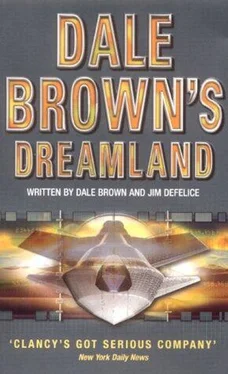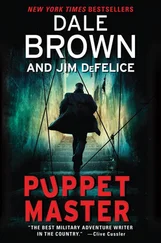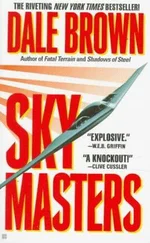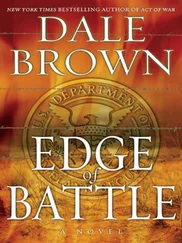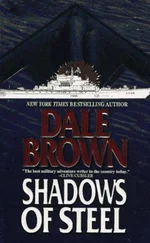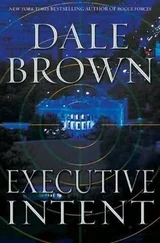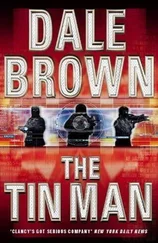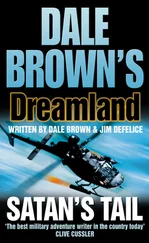“What’s going on?” he yelled at them over the wall.
“Supposed to be an armored car,” hissed one of the men, reminding him of the scenario. “We’re hitting it with the LANTIRN for the F-16.
“Shit. Right. Sorry,” said Gunny, taking advantage of the break to walk around to the edge of the wall rather than struggling over it. meanwhile, the fire team leader illuminated the pretend target so the F-16 above could hit it with the GBU-24’s.
“Destroyed!” yelped the team’s com specialist, who was communicating with the plane.
Gunny followed along as the team proceeded to the parking area where the Silkworm were supposed to be. The Marines moved quickly – a little too quickly, of course, since there was no one actually in front of them. The two demolition specialists set their charges on the Land Rovers.
“Move out, move out!” called the team leader.
Gunny retreated with the others. He barely made it back to the wall before the cars blew up.
“Okay, into the helicopter!” Captain Gordon screamed.
Gunny permitted himself a moment’s worth of satisfaction, staring at the flaming trucks. They’d made sure the gas tanks were full – might as well have one big boom. They he walked back toward the LZ, where the helicopter was winding its props.
“Helo outbound,” Smith told his flight.
The other pilots checked in as the four F-16’s proceeded to their postattack rendezvous point. In theory, two HARM missiles, six five-hundred-pound iron bombs, and a total of eight GBU-24’s had been fired at the ground installation on the coast of Somalia, all scoring hits. Destroyed were two SA-2 and four SA-3 ground-to-air launchers, along with their radar vans and specialized crews. More importantly, two batteries of Silkworm antiship missiles had also been wiped out. not to mention one tank, one armored car, and unspecified number of Somies.
Fantastic. Now if the Iranians and Somalians would cooperate, the operation c9ould proceed.
Smith squirmed in the F-16 seat. Canted back at thirty degrees to make it more comfortable in high-g maneuvers, if felt awkward to him, almost as if he were sitting in a dentist’s chair. He knew that eventually he’d get used to it, but that didn’t soothe the kinks in his shoulders.
Mack checked the time. Four-forty. They had plenty of time to go again, as planned. But before he could signal the helicopter, their ground controller broke in.
“Poison Flight, this is Madcap Magician. Return to base. Repeat, return to base.”
“One copies,” he said, recognizing the voice of ISA commander Major Hal Briggs.
Briggs ordinarily wasn’t up this early, et alone working the radio. And Mack knew the major was supposed to be in Saudi Arabia today, overseeing another operation only tangentially related to the crisis in Somalia.
Smith’s heart started double-pumping. “Okay, guys,” he told the others. “Let’s get back to base pronto.”
The White House
21 October, 0700 local
In his seven months as special assistant to the National Security Council, Jed Barclay had seen – seen, not met, not talked to – the President of the United States of America exactly twice before. And now today – now, this instant – he was giving him a personal briefing in the upstairs residence of the White House on the most important and dangerous international development since the Gulf War.
Hell, this was twenty times more dangerous, as he was endeavoring to point out between his nervous coughs and tremors.
The President’s Chief of Staff frowned as the word ‘hell’ escaped from Jed’s mouth. Neither the President nor Ms. O’Day reacted. Jed pushed on.
“The Iranian mullahs have decided that the time is right for their greater Islamic League. That is, of course, Islam as they interpret it, not as most of the rest of the world or even the Iranians interpret it. but you’re all aware of that. The takeover of the Somalian government was the first step. Locating the Silkworm antiship missiles there was the second. They had a credible threat to shipping, and their ultimatum must be taken seriously. In a few months, they’ll have the aircraft carrier they’re building with the Chinese. Either the West – us basically – adds a one-hundred-percent tax to the price of oil and divides it among the members of their alliance, or they will attack shipping. They’ve menaced two ships already.”
Jed paused, sensing that he was starting to hyperventilate. He had prepared a short sidebar to his presentation outlining the origins of some of the weapons systems known or suspected to have been shipped to Somalia and southern Iran, including a dozen improved SA-2Bs that seemed to have come from Yugoslavia. But it was superfluous and his audience was anxious; he took a long breath and moved on.
“We have several options. The first, of course, is negotiation –”
President Lloyd Taylor shifted in his seat. “Cut to the chase, son. The election will be over before your report is. What are the odds of the covert action working?”
Jed literally gulped as his mind shifted gears. He had prepared long arguments for and against each option, including the Madcap Magician operation the President had just referred to. That plan – removing the surface-to-ship and surface-to-air missiles in Somalia with a ‘sanitized’ covert-action team – was, in fact, his recommendation. But he’d come expecting to have to argue for it, and only now realized that the President might actually already had discussed and considered it in great detail with Ms. O’Day.
He coughed, the jumped to what he had planned as the conclusion to his presentation.
“By knocking out the missiles we can demonstrate a firm hand. Resolve, I mean,” said Jed. “At the same time, the diplomatic solution can proceed. The covert, I mean, Madcap Magician, is preferable because it can move quickly and provides at least a veneer of deniability. In any event, full military intervention would take days if not weeks to pull together, by which time the price of oil will have risen catastrophically. Madcap Magician has positioned and trained units under the Ironweed contingency; they need only a few hours’ notice. As far as negatives go, we’re working without real-time satellite coverage and the intel –”
“Odds of success,” prompted Ms. O’Day in a stage whisper.
“The simulations,” he said, “have shown a seventy percent chance of success.”
“Seventy percent?” said the President’s Chief of Staff.
“I think it’s work the risk,” said O’Day.
“What does our Harvard whiz kid think?” asked the President. He said Harvard the way someone who had graduated from Yale would.
“Well, sir.” Jed fumbled with his tie as memorizing he speech. “I, uh – concur with Ms. O’Day. However, we have to –“
“However, you feel that the possibility of failure is higher than the models indicate,” said the President. “But that we should proceed anyway.”
“Well, see, it depends on what you’re measuring. There’s a built-in prejudice in any such model. I mean, I tried to keep it out of this one, O’Day had warned him, above all else, not to use the word ‘coefficient.” “But the real issue here goes beyond the computer model.”
“I agree. Computer modeling of political situations is absurd,” said Taylor’s Chief of Staff.
“Well, that’ a bit far,” snapped Jed, momentarily forgetting where he was. “I mean, the thing is, we do need tools to qualify certain factors. See, my point is, Mr. President, we have to meet this aggressively. To a certain extent, we have to be willing to risk partial military failure. And we also have to anticipate adverse reaction from the other Arab states. Saudi Arabia will feel particularly vulnerable, as will Egypt. They’ll definitely bar their bases to us. We’ll end up having to rely on Israel for the military buildup, and that will have even more consequences. But if we do nothing – if we fold – the results will be disastrous. We should be prepared for a measured but aggressive response. When Libya joins the coalition – and I say when, not if – we should attack with everything we’ve got. There are a dozen contingency plans drawn up for that. At that point, the Greater Islamic League folds. I’m certain of that.”
Читать дальше
